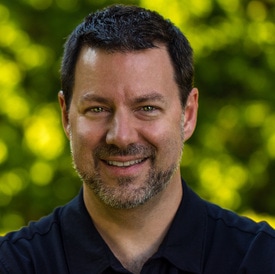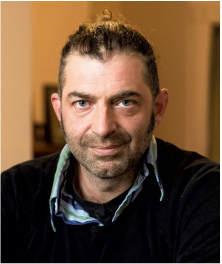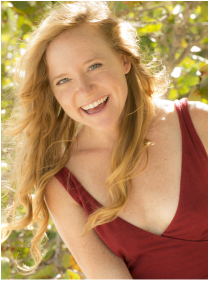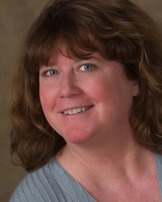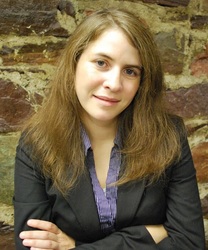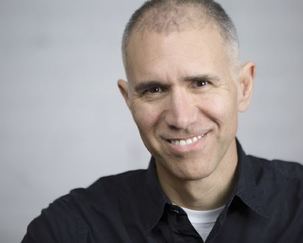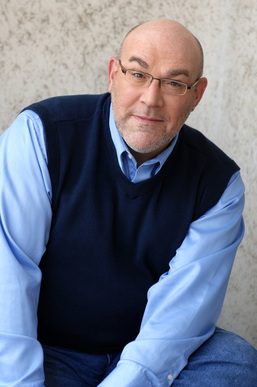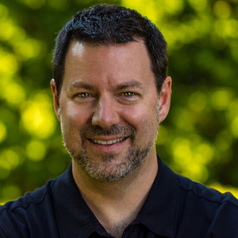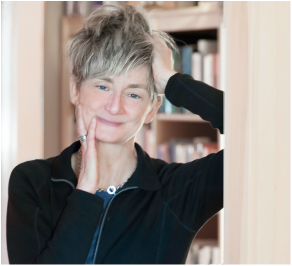 Director Robin Fawcett
Director Robin Fawcett Funny you ask. I was just thinking how everyday this week my motor’s been humming inside a prime example of “dream collaboration.” In our FUN HOME rehearsal room at Elley-Long, where the stage dimensions are humbly taped on the floor, the space is abuzz with a diverse collection of people earnestly pursuing the same hefty goal. I love this. Yet, it’s not simply this shared sense of industry that’s so fine, but a particular kind of approach that, for me, beats all. Let’s call the approach “serious play.”
The “serious” part involves everyone taking wholehearted responsibility for their role, coming on time, working hard, and being utterly prepared. Check! The “play” part requires a crazy big, can-do, positive attitude and supportive environment. “Play” requires everyone to keep play, well… in play. And when it is… possibility opens, fear is low, creativity high, laughter happens, mistakes become opportunities, and risks are freely taken leading to, well, wow… Pinch me. Am I asleep?
What have you enjoyed most while working on this musical so far?
The nouns. To direct, is to go on a twisty-turning adventure with people, places, and things. So, starting with a thing, I’ve so enjoyed my deep dive into the play itself, coming to understand its construction, meanings, and Bechdel inspiration. Because of this I know more intimately why this play is a Pulitzer Prize for Drama Finalist and Tony Award winner for Best Book of a Musical, Best Original Score.
Places. Working on this musical, has provided a scavenger hunt leading me to a welcome collection of meaningful places: the end of a long dark hallway at Saint Joseph’s School for a late afternoon cabaret, the kitchen’s and living rooms of new collaborators, Shy Guy Gelato at closing time, NYC Pearl Studios in a torrential rain, and previously forgotten corners of my life.
And, then there are the people, the most affecting noun of the adventure. No doubt I’ll be changed by working with and learning from each of them. An additional fun fact for me among the people, is that my Musical Director, Randal Pierce, and Sound Designer, Zach Williamson, were once my students.
Now that you are a week into rehearsals, what has surprised you about the process of staging FUN HOME?
I am surprised by three things I already knew but not to the extent I know them now. 1. How much better I feel to be out of the phase of preparation solitude. 2. How thrilling it is to give away previously conceived ideas and see them informed and transformed by oh-so-talented others. 3. Staging FUN HOME is an incredible artistic challenge to get to have.
Is there anything that scares you?
Everything?
What do you find most challenging about directing a musical versus a play?
While music usually adds a level of complexity to the storytelling, and collaboration, and scheduling, and staging turned choreography, I find the added complexity more than balanced by the inspiration I take from this incredible ingredient -- music! The challenge when directing non-musicals, is to find and conjure the sense of music when there is none.
What is your favorite moment in this musical?
There’s a glimmer-of-a-moment at the end of the play when Small Alison gives her Dad instructions on how to hold her up above him. It’s a moment that could be missed in the rich musical layers of the Finalé. But, if not missed, it is a lovely turning point, when Alison finds in a fleeting memory, and through her younger self, a key to an otherwise closed door.
How is the musical adaptation different from the graphic novel?
It’s interesting to compare and contrast these two versions of Alison Bechdel’s story: one a graphic novel and the other a musical for the stage. In doing so, there are obvious differences in the artistic forms, story telling approach, and level of detail.
But what has interested me is a surprising comparison I’ve found between the 232 page graphic novel and the 75-minute play. It’s a comparison that captures the beauty of the translation from one art form to another. Whether intentional or not, there’s an uncanny parallel between the cartoon line of the novel and the instrumental line in the soundscape of the play. Incredibly, the instrumental line of the musical provides a landscape of atmospheres, themes, symbols, and commentary on the dialogue and lyrics, much like the cartoon lines non-verbal relationship to the captions.
Fun Home is playing October 4-29 at FlynnSpace.

